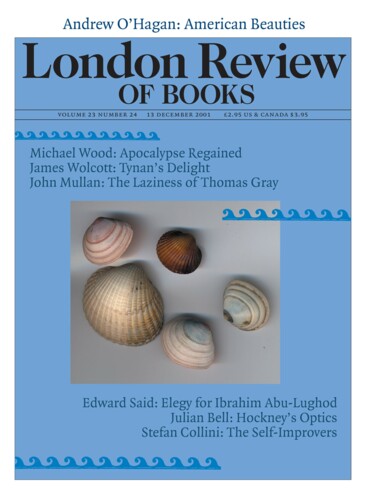On 22 November, judgment was handed down in a case brought against Macmillan and Danis Rose by the estate of James Joyce. Ulysses: A Reader’s Edition, edited by Rose, was published by Macmillan in 1997. Joyce died in 1941, and under the Copyright Act 1956 any of his work that appeared while he was alive passed out of copyright on 1 January 1992. Three days later, Rose read a newspaper article entitled ‘Now it is open season on James Joyce’ and began work on a new edition of Ulysses. The first thing he did was type out the entire text of the 1922 first edition (this was a time-consuming business, ‘precluding him from any other full-time job’ for several months). He then downloaded another version of 1922 from the Internet and got his computer to compare the two: any discrepancies between them he checked and corrected, in this way establishing an immaculate copy of the first published edition. The next stage was to go through every available manuscript, typescript, corrected proof, published edition etc, and amalgmate all the variants, before eliminating every version but one. Finally, and most controversially, he put the text into his own ‘house style’, which involved altering the punctuation, splitting up compound words and checking the facts. For example: most editions include the phrase, ‘its unplumbed profundity in the Sundam trench of the Pacific exceeding 8000 fathoms’. In the 1911 edition of the Encyclopaedia Britannica, which Joyce owned, the Sunda Trench, in the Indian Ocean, sounded in 1906, was said to be 3828 fathoms deep. The Mariana (or Marianne) Trench, near Guam, was said in the same encyclopedia to be 5629 fathoms, but has since been measured to 6033. Rose therefore (I suppose there’s some logic to it) changed the phrase in Ulysses to read: ‘its unplumbed profundity in the Marianne Trench, exceeding 6000 fathoms’ (the comma is one of many he inserted throughout the novel). If only he’d done all this seventy years earlier, when Joyce could have read it.
The Joyce estate is one of the fiercest in the business. Last year, the Irish Times told the story of David Fennessy, a 23-year-old Irish composer studying in Scotland who asked for permission to use 18 words from Finnegans Wake in a three-minute choral piece. Stephen Joyce refused. ‘My wife and I don’t like your music,’ he said.
In the recent case, the estate contended not only that the edition infringed their copyright on two counts, but that something which couldn’t properly be described as Joyce’s Ulysses was being passed off as such. The first alleged copyright infringement concerned the reproduction of material published during Joyce’s lifetime. On 29 October 1993, the EEC passed a directive harmonising copyright across Europe. The new regulations, extending the period to 70 years after the death of the author, came into force in Britain on 1 January 1996. They are more lenient in cases where copyright was revived rather than merely extended, and publishing material copied from 1922 – most of the words in the ‘Reader’s Edition’ – wasn’t unlawful, Mr Justice Lloyd ruled, but payment of royalties was required. For work that didn’t appear until after the author’s death, the period of copyright begins with first publication. A facsimile of the Rosenbach manuscript – a fair copy of the text of Ulysses which Joyce sent to John Quinn in instalments between 1920 and 1922 – came out in 1975. Having argued unsuccessfully that the ‘underlying materials’ were implicitly published with the first edition, the defence then said that the amount copied was little enough not to count. But the judge observed that the passages’ ‘importance lies in the very fact that they are being restored to the text, and that their inclusion is one of the things that makes the “Reader’s Edition” special and distinct’. An injunction was granted preventing further publication, and Macmillan and Rose have to pay compensation to the estate.
The Casaubon v. Dryasdust aspects of the case really come into their own in the ‘passing-off’ claim. Of the expert witnesses, Mr Justice Lloyd said: ‘It seemed to me that much of the evidence of each of them failed to meet that of the other. Though reading their reports and listening to their testimony has educated me on some matters of which I previously knew little or nothing, I cannot say it has assisted me greatly in resolving the issues before me.’ A conventional instance of passing-off would be ‘selling lemon juice in a plastic lemon-shaped container which customers associate with a different manufacturer’. If someone went around selling copies of Ulysses that turned out to be John Grisham novels wrapped in the wrong dust-jacket, they might be liable. But while it could be argued (as many do) that Rose’s isn’t a good edition of Ulysses, you couldn’t really say it wasn’t Ulysses at all. And it is something, I suppose, to know that Ulysses doesn’t fall into quite the same category as plastic lemons.
Send Letters To:
The Editor
London Review of Books,
28 Little Russell Street
London, WC1A 2HN
letters@lrb.co.uk
Please include name, address, and a telephone number.

